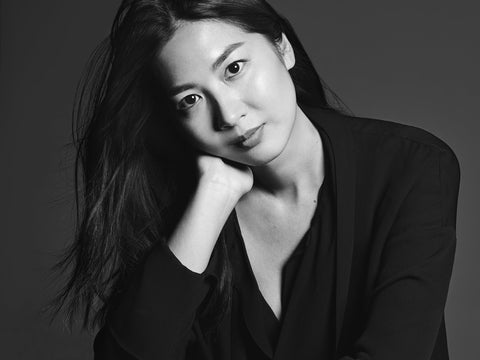
Branding the Beauty Brands | KANA OTOMO 大友香那
Creating a Successful Career in the Digital Beauty Space
KANA OTOMO( 大友香那) is a freelance art director/creative director based in NY and LA. Originally from Tokyo, Kana graduated from Parsons School of Design in 2009 with a BFA in Communication Design. Since then, she has worked at several award-winning design agencies including Gin Lane, King & Partners, and Someone & Others. Her clients include Google; Mikimoto; and beauty brands such as Japanese cosmetic company Shiseido and its luxury skincare brand Clé de Peau Beauté, Starface, KNC Beauty, Kosas, and more.

IPSY
IROHA: Tell us about projects you have worked on.
KANA: After graduating from Parsons, I started out my career as a digital designer, getting experience at digital agencies in New York such as Gin Lane and King & Partners, which create branding for businesses in the direct-to-consumer space. I made a pivot to focus more on art direction when I realized I was interested in the craft of image-making. I ended up moving to LA to work at a beauty startup called Violet Grey. Since then, I’ve had the opportunity to continue working primarily in the beauty space, ranging from global luxury brands to early-stage startups, and anything in between. With the more established brands like Clé de Peau and Shiseido, I was able to immerse myself in the history and DNA of each brand and work on global campaigns of high production value, and I loved every opportunity to be on set with and learn from some of the most talented people in the industry. Working with the startups, on the other hand, you have a chance to build the brand from the ground up, be more experimental and playful. I worked as a freelance co-Creative Director for my husband’s branding agency Someone & Others, and we worked together on a handful of beauty brands like IPSY, KNC Beauty, Kosas, and Starface.

Starface
I always gravitated toward clean, minimal aesthetics, which worked well for the brands I worked with. With the branding of Starface, an acne skincare brand, I really had the chance to push myself creatively and have fun after working in the luxury space for a while. The experience of growing up in Japan in the ‘90s inspired and played a big role in what we ended up creating, including the bright, optimistic color palette and the brand mascot, which is quite unique for a beauty brand to have. We oversaw every facet of creative for the brand for about two years, and I am really proud of how much the brand has resonated with teens and young adults.
Most recently I worked on the launch of two new brands. One is a beauty brand spearheaded by actor Evan Mock, called Good Weird. Another one is a transdermal patch brand called Wearables, which is the first internal brand launched by Someone & Others.

Wearables
IROHA: Tell us about the work or project you are currently working on.
KANA: I’ve actually had to take a break from work for the last several months due to illness. It was nerve wracking to stop completely at first, but in hindsight I will see it as an opportunity to slow down, reflect, and re-prioritize everything in my life and career after such a hectic few years. It made me realize how truly burnt out I was, and it forced me to learn not to tie my self-worth to how much work I was producing, and to be more selective with the projects I want to take on in the future.

Good Weird
IROHA: Based on your experience with breaking through the Asian glass ceiling, what is your advice to younger Asians?
KANA: I’ve been extremely lucky in that throughout my career, I frequently worked with managers or clients who are Asian, and they are often the same people I learned the most from. Most of them had moved to the States as teens or young adults, like me, so we shared similar backgrounds and experiences of learning to assimilate in this country. That was very helpful for me, as someone who wasn’t born and raised here and had a very different cultural upbringing. From them, I learned that you don’t always have to be the most vocal person in the room to be successful or effective, which is something I always struggled with as an introvert who needs to absorb, digest, and think through carefully first before having something to say. As much as it’s important to recognize and be aware of existing Asian stereotypes, if you are naturally a more introverted and measured person, it is okay to embrace the great listener and analytical thinker in you and play that to your strength. Another piece of advice I wish I could give my younger self is not to let anyone else decide for you what a successful career means. It can come in many forms, whether it’s recognition, money, work-life balance, or fulfillment, and only you can decide what that looks like.
IROHA: Based on your work or background, do you have any advice or a message for young people who want to follow in your footsteps?
KANA: To be persistent and curious in honing your craft, and really take the time to practice and learn, even from—or more so from—your mistakes and failures. It is so easy nowadays to compare yourself to someone else you see on social media and feel like you are falling behind or not doing enough. Keep in mind that behind every successful project or career, there are disappointments that often don’t get shared.
written by Susan Miyagi McCormac
IPSY: Brand Manifest Film Directed by Carissa Gallo Model Photography by Kayla Varley & Still Life Photography by Michele Andersen / Good Weird: Model photography by Alec Artidiello / Wearables: Photography by Alec Artidiello / Starface: Animations by Chelsea Agno, Mathieu L.B and Shalinder Matharu
KANA OTOMO's Linkedin
